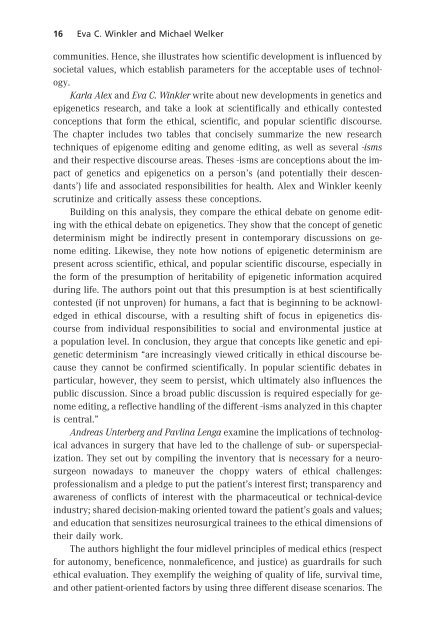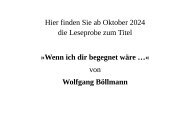Michael Welker | Eva Winkler | John Witte, Jr. | Stephen Pickard (Eds.): The Impact of Health Care (Leseprobe)
Pluralism has become the defining characteristic of many modern societies. Not only a plurality of individual and social claims and activities gain impacts on societal life. A creative pluralism of institutions and their norms profoundly shape our moral commitments and character – notably the family, the market, the media, and systems of law, religion, politics, research, education, health care, and defense. In the theoretical, empirical, and historical contributions to this volume, specialists on medicine, medical ethics, psychology, theology and health care discuss the many challenges that major transformations in their areas of expertise pose to the communication and orientation in late modern pluralistic societies. Contributors come from Germany, the USA and Australia.
Pluralism has become the defining characteristic of many modern societies. Not only a plurality of individual and social claims and activities gain impacts on societal life. A creative pluralism of institutions and their norms profoundly shape our moral commitments and character – notably the family, the market, the media, and systems of law, religion, politics, research, education, health care, and defense.
In the theoretical, empirical, and historical contributions to this volume, specialists on medicine, medical ethics, psychology, theology and health care discuss the many challenges that major transformations in their areas of expertise pose to the communication and orientation in late modern pluralistic societies. Contributors come from Germany, the USA and Australia.
You also want an ePaper? Increase the reach of your titles
YUMPU automatically turns print PDFs into web optimized ePapers that Google loves.
16 <strong>Eva</strong> C. <strong>Winkler</strong> and <strong>Michael</strong> <strong>Welker</strong><br />
communities. Hence, she illustrates how scientific development is influenced by<br />
societal values, which establish parameters for the acceptable uses <strong>of</strong> technology.<br />
Karla Alex and <strong>Eva</strong> C. <strong>Winkler</strong> write about new developments in genetics and<br />
epigenetics research, and take alook at scientifically and ethically contested<br />
conceptions that form the ethical, scientific, and popular scientific discourse.<br />
<strong>The</strong> chapter includes two tables that concisely summarize the new research<br />
techniques <strong>of</strong> epigenome editing and genome editing, as well as several -isms<br />
and their respective discourse areas. <strong>The</strong>ses -isms are conceptions about the impact<br />
<strong>of</strong> genetics and epigenetics on aperson’s (and potentially their descendants’)<br />
life and associated responsibilities for health. Alex and <strong>Winkler</strong> keenly<br />
scrutinize and critically assess these conceptions.<br />
Building on this analysis, they compare the ethical debate on genome editing<br />
with the ethical debate on epigenetics. <strong>The</strong>y show that the concept <strong>of</strong> genetic<br />
determinism might be indirectly present in contemporary discussions on genome<br />
editing. Likewise, they note how notions <strong>of</strong> epigenetic determinism are<br />
present across scientific, ethical, and popular scientific discourse, especially in<br />
the form <strong>of</strong> the presumption <strong>of</strong> heritability <strong>of</strong> epigenetic information acquired<br />
during life. <strong>The</strong> authors point out that this presumption is at best scientifically<br />
contested (if not unproven) for humans, afact that is beginning tobeacknowledged<br />
in ethical discourse, with aresulting shift <strong>of</strong>focus in epigenetics discourse<br />
from individual responsibilities to social and environmental justice at<br />
apopulation level. In conclusion, they argue that concepts like genetic and epigenetic<br />
determinism “are increasingly viewed critically in ethical discourse because<br />
they cannot be confirmed scientifically. In popular scientific debates in<br />
particular, however, they seem to persist, which ultimately also influences the<br />
public discussion. Since abroad public discussion is required especially for genome<br />
editing, areflective handling <strong>of</strong> the different -isms analyzedinthis chapter<br />
is central.”<br />
Andreas Unterberg and Pavlina Lenga examine the implications <strong>of</strong> technological<br />
advances in surgery that have led to the challenge <strong>of</strong> sub- or superspecialization.<br />
<strong>The</strong>y set out by compiling the inventory that is necessary for aneurosurgeon<br />
nowadays to maneuver the choppy waters <strong>of</strong> ethical challenges:<br />
pr<strong>of</strong>essionalism and apledge to put the patient’sinterest first; transparencyand<br />
awareness <strong>of</strong> conflicts <strong>of</strong> interest with the pharmaceutical or technical-device<br />
industry; shareddecision-making oriented toward the patient’sgoals and values;<br />
and education that sensitizes neurosurgical trainees to the ethical dimensions <strong>of</strong><br />
their daily work.<br />
<strong>The</strong> authors highlight the four midlevel principles <strong>of</strong> medical ethics (respect<br />
for autonomy, beneficence, nonmaleficence, and justice) as guardrails for such<br />
ethical evaluation. <strong>The</strong>y exemplify the weighing <strong>of</strong> quality <strong>of</strong> life, survival time,<br />
and other patient-oriented factors by using three different disease scenarios. <strong>The</strong>
















